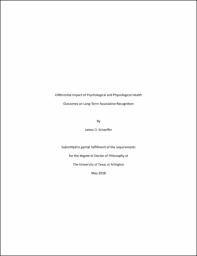
ATTENTION: The works hosted here are being migrated to a new repository that will consolidate resources, improve discoverability, and better show UTA's research impact on the global community. We will update authors as the migration progresses. Please see MavMatrix for more information.
Show simple item record
| dc.contributor.advisor | Liegey-Dougall, Angela | |
| dc.creator | Schaeffer, James D. | |
| dc.date.accessioned | 2020-06-23T21:55:13Z | |
| dc.date.available | 2020-06-23T21:55:13Z | |
| dc.date.created | 2018-05 | |
| dc.date.issued | 2018-05-17 | |
| dc.date.submitted | May 2018 | |
| dc.identifier.uri | http://hdl.handle.net/10106/29167 | |
| dc.description.abstract | Evidence suggests that lifestyle and environmental factors may contribute to later life cognitive decline and dementia. Although there is a large amount of evidence linking psychological and physiological factors to general memory performance, little focus has been given to specific memory systems. The present study was designed to investigate relationships between psychophysiological health predictors and recollection and familiarity processes of recognition memory. We hypothesized that these recognition processes may be differentially impacted by the included health variables. The present study involved 96 relatively healthy young adults between 17 and 25 years old. Health measures included visceral obesity (waist-to-hip ratio), heart rate variability (root mean square of the successive differences in heart beats), inflammation (serum interleukin 6 levels), stress and anxiety (Perceived Stress Scale and the State-Trait Anxiety Inventory), and depression symptoms (Center for Epidemiological Studies Depression Scale-Revised). The results showed that state and trait anxiety were related to recollection, but not familiarity. High trait anxiety was related to better recollection, whereas high state anxiety was related to poorer recollection. We also found that heightened levels of inflammation and depression symptoms were related to worse recollection, but better familiarity. Furthermore, we showed that trait anxiety, inflammation, and depression served as suppressor variables for each other. These findings suggested that trait anxiety was beneficial for recollection, especially when inflammation and depression were controlled, and that inflammation and depression shifted recognition processes from recollection toward a greater dependence on familiarity. These findings are important because they demonstrate that depression and inflammation are impacting recognition processes in young, relatively healthy adults, suggesting a need for health interventions early in life to help prevent late life cognitive decline and dementia. | |
| dc.format.mimetype | application/pdf | |
| dc.language.iso | en_US | |
| dc.subject | Recognition | |
| dc.subject | Recollection | |
| dc.subject | Familiarity | |
| dc.subject | Unitization | |
| dc.subject | Stress | |
| dc.subject | Depression | |
| dc.subject | Inflammation | |
| dc.title | Differential Impact of Psychological and Physiological Health Outcomes on Long-Term Associative Recognition | |
| dc.type | Thesis | |
| dc.degree.department | Psychology | |
| dc.degree.name | Doctor of Philosophy in Psychology | |
| dc.date.updated | 2020-06-23T21:55:14Z | |
| thesis.degree.department | Psychology | |
| thesis.degree.grantor | The University of Texas at Arlington | |
| thesis.degree.level | Doctoral | |
| thesis.degree.name | Doctor of Philosophy in Psychology | |
| dc.type.material | text | |
| dc.creator.orcid | 0000-0002-0263-9567 | |
Files in this item
- Name:
- SCHAEFFER-DISSERTATION-2018.pdf
- Size:
- 1018.Kb
- Format:
- PDF
This item appears in the following Collection(s)
Show simple item record


